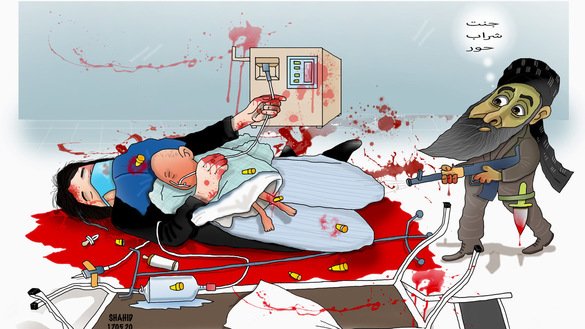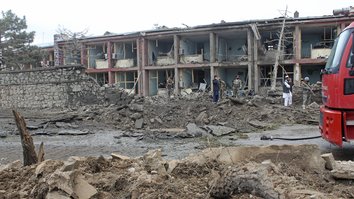KABUL -- Zia Gul gave birth to her daughter just an hour after escaping from gunmen who rampaged through a Kabul maternity ward on May 12 and now struggles to reconcile motherhood with the trauma of the massacre.
As she deals with the first days with her new daughter Roya, the sleepless nights familiar to any new parent are haunted by the gruesome attack that killed at least 24 people.
"I have nightmares every night," the 28-year-old said, sitting on a carpet in her Kabul home and cradling her sleeping daughter in her lap.
Newborns, mothers and nurses, were killed when gunmen posing as members of the security forces rampaged through the facility run by Doctors Without Borders (MSF) in an attack that shocked a country long accustomed to brutality after decades of war.

A Salaam Times cartoon depicts a terrorist in the act of murdering a mother and her baby during the recent attack on a maternity hospital in Kabul while he thinks of "paradise, wine, and virgins".
Afghan President Ashraf Ghani later pinned the blame on the Taliban, who denied any involvement, while the United States accused the "Islamic State of Iraq and Syria" (ISIS).
No group has claimed responsibility.
"Whenever I hear a loud sound or firecrackers, I think the attackers have come to kill me," said Gul from her home in an impoverished Kabul neighbourhood.
"The attack came suddenly; the attackers started shooting the babies and women giving birth," she said.
As the militants went on their killing spree -- described by MSF as "a systematic shooting" -- doctors at the hospital helped Gul and others hide.
She later managed to escape and was evacuated by security services to another facility.
An hour later, her daughter Roya was born, a blessing after suffering a prior miscarriage.
But the joy was dulled. Her mother-in-law, who had come with her to the hospital, was killed.
'Could not recognise her face'
Akram, 40, who gave only his first name, vividly recalls the aftermath of the horrific attack that killed his wife shortly after she had given birth to their daughter, Maryam.
Approaching the hospital bed where her body lay, he did not know the woman lying there was his wife.
"I recognised her from her feet," he said. "I could not recognise her by her face when I saw her."
He found his daughter after seeing a Facebook post saying she had been evacuated to another hospital, with an accompanying picture and phone number.
For many of the new parents -- many from poor neighbourhoods in Kabul -- the aftermath of the massacre has made it even harder to make ends meet.
Gul's husband is deaf, making it difficult for him to find work in normal times, she said, adding that a lockdown imposed on the capital to combat the coronavirus has made earning money even harder.
Nearly a dozen families who bore the brunt of the slaughter are surviving on aid given by the Relief and Emergency Fund for Afghanistan (REFA), a campaign group.
The group is helping by donating care packages, including food, diapers, clothes and other essentials, said Behzad Ghazi, the group's head for operations in Afghanistan.
Who will help the survivors overcome the trauma in the long run is another question, said Lyla Schwartz, a psychologist and founder of Peace of Mind Afghanistan, a non-governmental organisation.
Families often have little access to mental health care -- which is already limited -- and therefore are likely to be denied the "psychological help they need to heal", she said.
Akram, who runs a shop, has two other sons aged six and seven and an elderly mother to take care of. He is worried about how he will raise his youngest child.
"I don't think [my mother] has the ability to take care of the child," he said.

![Hasan Ali, 32, his wife, Zia Gul, 28, and their newborn daughter Roya, are shown at home on the outskirts of Kabul May 22 after they received relief aid from a charity. They survived a terrorist attack on a maternity ward in Kabul May 12, when gunmen posing as members of the security forces rampaged through the facility run by Doctors Without Borders (MSF). The massacre shocked a country long accustomed to brutality after decades of war. [Wakil Kohsar/AFP]](/cnmi_st/images/2020/06/01/24201-000_1s27w3-585_329.jpg)







We are very much grateful to your news website for publishing important news. In fact, you are working very hard to make the people of the country aware from the cruelties and atrocities of the terrorist groups and of the countries that want to destroy Afghanistan. Thank you so much again.
Reply3 Comment
We want the government to help survivors of the attack on Kabul maternity hospital. The government must take care of the new-born babies who have lost their mothers in the attack, because most of the Afghan people have economic problems and they cannot provide powder milk or formula for their babies.
Reply3 Comment
Attacking on a maternity hospital in Kabul is a very heinous and unforgettable act. The crime was recorded in the world’s history, as terrorists did not even have mercy on the new-born babies. Such crimes had never been committed anywhere else in the world, the way it was committed in Afghanistan. The government should make a right decision to eliminate the ISIS group, because peace cannot be made with ISIS. They are there only to kill. Peace cannot be made with the group that kills. All ISIS members who are in Afghanistan must be destroyed, and the prisoners of the group, who are being held in the country's prisons, must also be executed. If they are released, they will return to the battlefield and kill innocent people.
Reply3 Comment